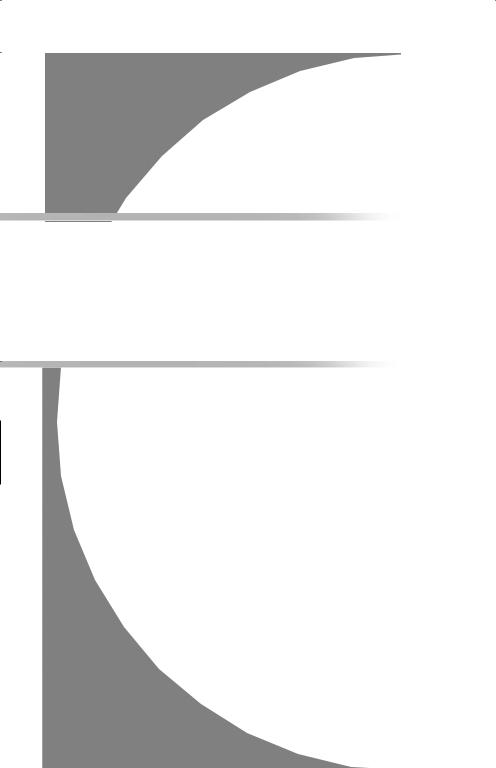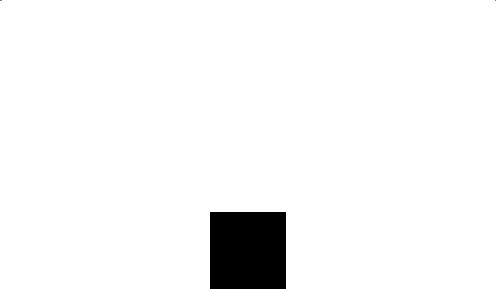
Tracy B., Fraser C. - TurboCoach[c] a powerful system for achieving breakthrough career success (2005)(en)
.pdf
Create Your Personal Strategic Plan |
9 |
|
moving rapidly up the executive ladder. She had managed this in spite of an almost crippling shyness that made her avoid the spotlight. She realized that to achieve her goal of becoming a vice president of her company, she would have to emerge from her shell and develop the skill of making effective presentations. She joined Toastmasters and worked diligently to become, first, an adequate speaker, then a competent speaker, and, finally, a highly skilled speaker. Today she has surpassed her initial goal and is now a senior vice president.
Eight Essential Questions
Here are eight essential questions to launch your personal strategic planning process. Apply your best and most analytical thinking to these fundamental questions. The answers will bring clarity to your search for an ideal business and career.
1.Values. In your business and career, which values, virtues, qualities, and traits hold the greatest importance?
2.Vision. Imagine yourself five years from today. If your career or business were perfect, what would it look like?
3.Mission. Based on your values, how, precisely, do you achieve your vision?
4.Purpose. One trait common to all truly successful executives and entrepreneurs is the possession of an ov-

10 |
|
|
|
|
|
|
|
|
|
|
|
|
|
|
|
|
|
|
|
|
|
|
|
|
|
|
|
|
|
|
|
|
|
|
|
|
|
|
|
|
|
|
|
|
|
|
|
|
|
|
|
|
|
|
|
|
TurboCoach |
|
|
|||||||||||||||||||
|
|
|
|
|
|
|
|
|
|
|
|
|
|
|
|
|
|
|
|
|
|
|
|
|
|
|
|
|
|
|
|
|
|
|
|
|
|
|
|
|
|
|
|
|
|
|
|
|
|
|
|
|
|
|
|
|
|
|
|
|
|
|
|
|
|
|
|
|
|
|
|
|
|
|
|
|
|
|
erarching purpose—a genuine desire to serve others through their work or business. What is the purpose of your career or business?
5.Goals. To fulfill your ideal future vision for your career or business, what specific goals must you achieve?
6.Knowledge and Skills. To achieve your goals and fulfill your vision, in what areas will you need to excel ?
7.Habits. What specific habits of thought and action will you need to become the person who is capable of achieving the goals you have set for yourself?
8.Daily Activities. What are the specific daily activities you will need to engage in to ensure that you become the person you want to become and achieve the goals you want to achieve?
Remember that the quality of your thinking determines the quality of your life. The more probing the questions you ask of yourself, the more meaningful and helpful the answers will be. Just as there is no limit to how much you can improve the quality of your thinking, there is no limit to how much you can improve your life.
According to the Law of Correspondence, your outer world will always be a reflection of your inner world. Nothing can change in your outer world without a corresponding change in your inner world. The more you know about yourself and your values and goals, the faster you will make the changes necessary for success.
Application Exercise
1.From the list of values found in the appendix at the end of this book, select the three to five values that

Create Your Personal Strategic Plan |
11 |
|
most represent the organizing principles of your career or business.
2.Clarify your career or business vision. What would your ideal career or business look like? What would you be doing most of the time? How much would you be earning? What kind of people would you be working with? What level of responsibility would you have? What kind of industry would you be in?
3.Based on your values and vision, define your career or business mission.
4.What is your career or business purpose? Whose lives does your career or business serve?
5.What one goal, if you achieved it, would help you the most in realizing your ideal career or business vision?
6.What one additional skill, if you were excellent at it, would help you to achieve your most important business/career goal faster than any other single skill?
7.What actions do you commit to take immediately as a result of insights gained in this chapter?
‘‘Having conceived of his purpose, a man should mentally mark out a straight pathway to its achievement, looking neither to the right
nor the left.’’
JAMES ALLEN
This page intentionally left blank

CHAPTER 2
What Business Are
You In?
‘‘. . . |
Chance only favors the mind that is prepared.’’ |
|
LOUIS PASTEUR |
|
Have you given any thought lately to the question of what business you |
|
are in? YES NO |
|
Have you given any thought lately to the question of what business you |
|
could be in? YES NO |
|
............................................................. |
|
This chapter examines how to determine who you are and what you |
|
want by explaining and illustrating the most important elements of |
|
goal setting and strategic thinking. The Application Exercise at the |
|
end of Chapter 2 leads you through the critical questions you must |
|
ask to begin this process. |
|
........................................................ |
13
This page intentionally left blank

SEVEN KEY QUESTIONS AND THEIR ANSWERS— applied repeatedly over the course of your career or the life of your business—can help you focus your thinking and direct your most important decisions. Ask yourself the following strategic questions on a regular basis. A new answer to any one of these questions can dramatically change the direction of your business and your career.
1.What business am I in?
2.What business might I be in?
3.Who or what is my competition?

16 |
|
|
|
|
|
|
|
|
|
|
|
|
|
|
|
|
|
|
|
|
|
|
|
|
|
|
|
|
|
|
|
|
|
|
|
|
|
|
|
|
|
|
|
|
|
|
|
|
|
|
|
|
|
|
|
|
TurboCoach |
|
|
|||||||||||||||||||
|
|
|
|
|
|
|
|
|
|
|
|
|
|
|
|
|
|
|
|
|
|
|
|
|
|
|
|
|
|
|
|
|
|
|
|
|
|
|
|
|
|
|
|
|
|
|
|
|
|
|
|
|
|
|
|
|
|
|
|
|
|
|
|
|
|
|
|
|
|
|
|
|
|
|
|
|
|
|
4.Who are my customers?
5.What is my area of excellence?
6.What are my critical constraints?
7.Where am I in terms of my personal and career development?
This chapter explores the first two questions. Questions three through seven will be examined in the chapters that follow.
Define Your Career or Business Clearly
The first and most important question is: What business am I in? This question is not as simple as it seems. To identify your career or business goals, you must first learn to define your business in terms of what you do for your customer or for your company. Expand the definition of your business so that it is as broad as possible. Never stop with the first answer. Take the first answer to this question and find new applications, new markets, and new definitions for it.
For example, at the beginning of the last century, those railroads that defined themselves strictly as railroads— providers of rail transport—failed to see that new technologies and methods of transport, such as trucks and airplanes, were a potential threat to their business. If they had defined themselves instead as movers of goods and people—provid- ers of transportation—their response to the changes in technology might have been different.
Similarly, in the early years of the Internet boom, many companies operating in that sector defined themselves as pro-

What Business Are You In? |
17 |
|
viders of free information with a goal of attracting as much traffic as possible. Those companies that failed to focus on selling products or services and making a profit went out of business. They did not see that the Internet is a communication and distribution channel that must be focused on generating revenue and making a profit, like any other business. This failure to accurately define their environment and their business led to the loss of many billions of investment dollars.
When you define your business, think in terms of how your products or services affect or interact with the lives or work of other people or organizations. Consider both existing customers and customers you would like to acquire. When you define your personal work, consider the people you work for and the people you work with. Think about the effect or impact you and the products or services you provide to the organization have on both internal and external customers.
Target the Future:
What Business Could You Be In?
The next question to ask is: What business will I be in if things continue the way they are today?
Think about your career or business two years from now, then in five years. If you do not change the way you define your work or your business, what kind of work will you be doing? Is it a sound and viable strategy to continue in your current way of working or doing business, or should you be looking at changing it in some way?
Start by imagining what business you could be in. Where

What Business Are You In? |
19 |
|
6.What changes will you have to make personally to make it your ideal business?
7.What actions do you commit to take immediately as a result of insights gained in this chapter?
‘‘Everyone who got where
he is had to begin where he was.’’
ROBERT LOUIS STEVENSON
